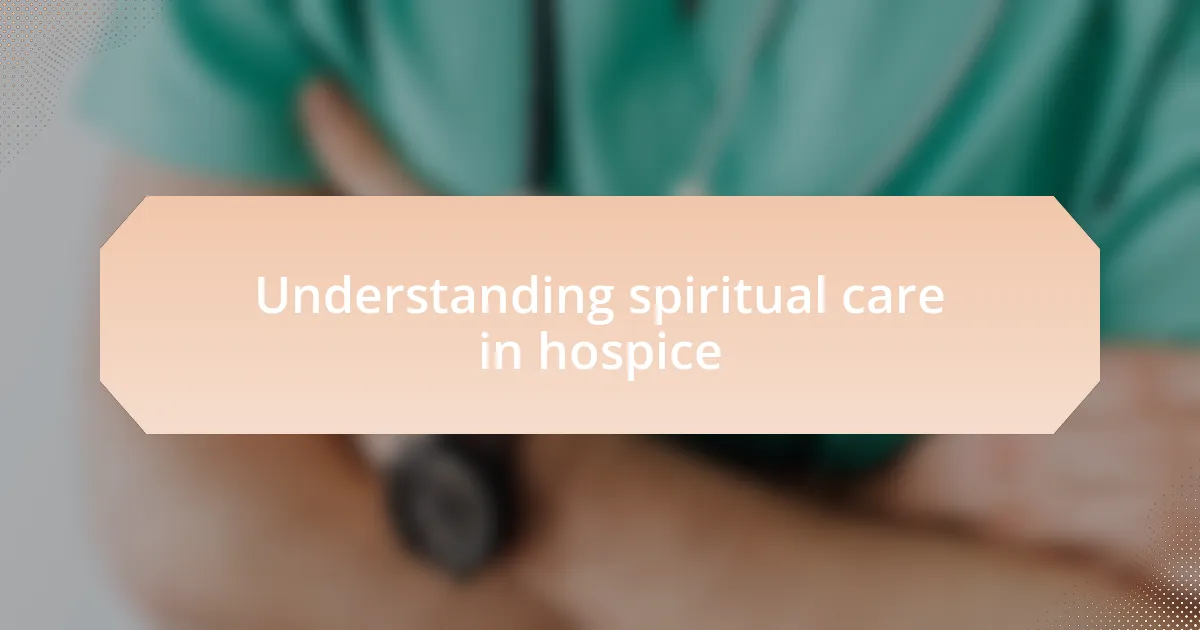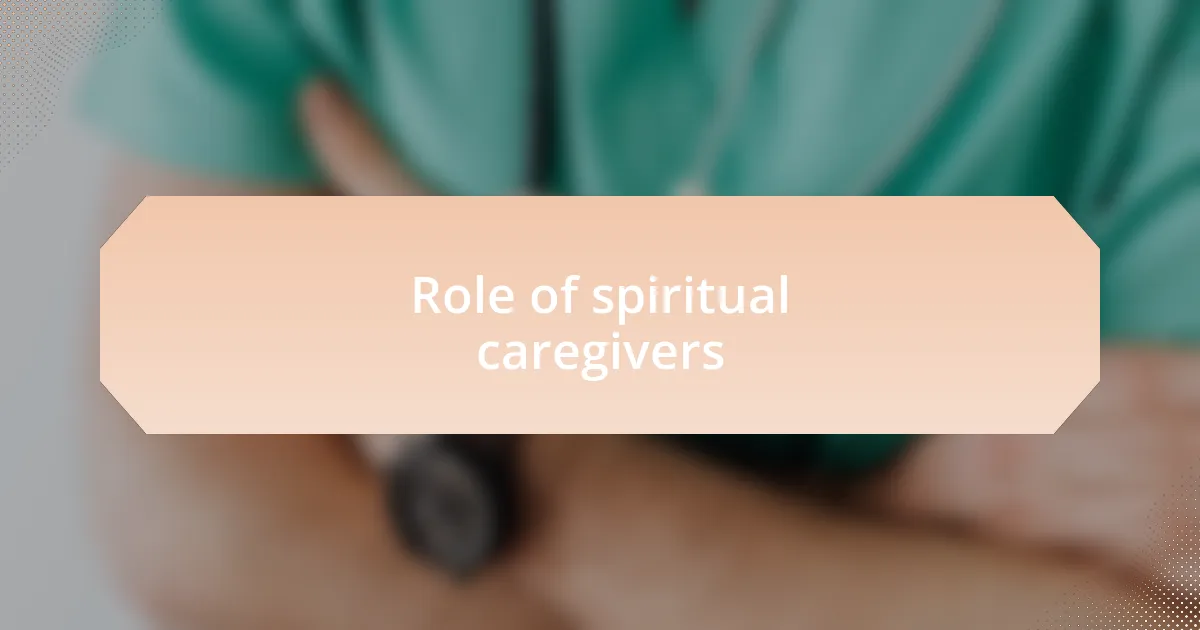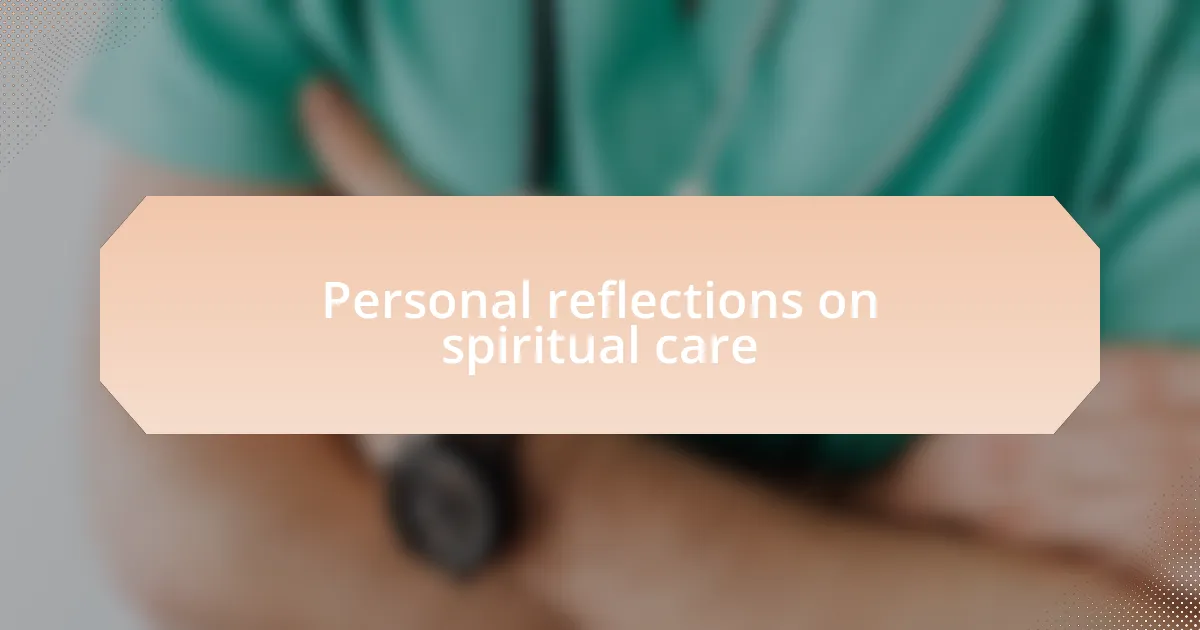Key takeaways:
- Spiritual care in hospice focuses on addressing emotional and existential needs, fostering deep connections between caregivers and patients through meaningful conversations.
- Hospital ministry is crucial for supporting both patients and healthcare staff, promoting healing through compassion and shared experiences.
- Spiritual caregivers play a vital role by facilitating discussions and honoring individual journeys, allowing for reflection and emotional healing.
- Engaging patients and families through storytelling, simple gestures, and collaborative activities enhances emotional support and strengthens family bonds.

Understanding spiritual care in hospice
In hospice care, spiritual care is a fundamental aspect that addresses the emotional and existential needs of patients and their families. I remember working with a patient who, despite facing immense physical pain, found solace in discussing memories that had deep spiritual significance. This process not only brought comfort to them but also illuminated their life journey for everyone involved, showing how spirituality intertwines with our sense of being.
Often, I find myself reflecting on the profound questions that arise during end-of-life care. How do we help someone find peace when facing their mortality? Spiritual care in hospice becomes a guiding light in this exploration, offering support tailored to individual beliefs, whether they are religious or not. It creates a safe space for patients to express fears, hopes, and insights, allowing them to confront life’s biggest questions with dignity.
Moreover, witnessing the bond between caregivers and those they serve can be truly moving. I’ve seen how a simple conversation about faith or the meaning of life can spark deep connections, fostering a sense of belonging even in the shadows of uncertainty. This underscores the essence of spiritual care in hospice: it’s not just about tending to physical needs but also nurturing the soul, fostering hope, and facilitating healing in ways that go beyond the tangible.

Importance of hospital ministry
In my experience, hospital ministry plays a crucial role in the healing process, addressing not only the medical but also the emotional and spiritual needs of patients. I recall a moment when a chaplain sat with a family in distress, helping them navigate the complex emotions of saying goodbye to a loved one. That presence brought a sense of peace; it was a reminder that we are not alone in our struggles.
Additionally, the importance of hospital ministry extends to the support it provides for healthcare staff, too. I’ve witnessed nurses and doctors feeling overwhelmed by the weight of their responsibilities, and how a brief moment spent talking with a hospital minister can rejuvenate their spirits. This sense of community and shared purpose fosters an environment where everyone, patients and caregivers alike, can thrive together.
In reflecting on the nature of human connection in healthcare, I often ask myself: what truly brings healing? From my perspective, it’s the compassion and understanding that flow through hospital ministry. This spiritual support enables us to face the most daunting aspects of life with newfound strength and tranquility, underlining the significance of ministry in creating a holistic approach to health and well-being.

Role of spiritual caregivers
Spiritual caregivers serve as vital companions on the often challenging journey through hospice care. I remember meeting a hospice chaplain who listened deeply to a patient’s storytelling about their life experiences, allowing them to reflect on cherished memories. This interaction was not merely about comfort; it was a powerful reminder that sharing one’s story can be a form of healing that transcends fear and anxiety.
In another instance, I observed how a spiritual caregiver facilitated a discussion among family members who were grappling with unresolved feelings. They gently guided them in expressing their grief and love, transforming a tense atmosphere into one of peace and unity. This role goes beyond just offering prayers; it’s about creating a sacred space for reflection and emotional connection, ultimately honoring the individual’s journey.
I often wonder how much of the hospice experience is shaped by these spiritual encounters. Consider the impact of having someone who embodies understanding and empathy. Spiritual caregivers not only provide compassionate support but also encourage families to confront and embrace their feelings, highlighting the profound significance of spirituality in the final stages of life.

Approaches to spiritual support
When it comes to spiritual support in hospice, I believe that personalized approaches make all the difference. I recall a time when a nurse invited a patient’s favorite musician to play soothing music during their final days. This simple act seemed to elevate the atmosphere, creating a transcendent experience where music became a bridge between this world and the next. How often do we overlook the power of such thoughtful gestures in nurturing the spirit?
Another approach that resonates with me is the use of ritual in spiritual care. There was a family I knew who engaged in lighting candles every evening to honor their loved one’s journey. Each flickering flame was a testament to their memories, love, and even their grief. It sparked conversations about life, legacy, and the sacredness of their shared experiences. Rituals can offer comfort, providing a familiar touchstone in times of upheaval.
It’s also crucial to remember the importance of silence and presence in spiritual support. I once sat with a patient who simply needed someone to hold their hand without uttering a word. That unspoken connection spoke volumes, conveying acceptance and tranquility. Have you ever felt how silence can carry an immense weight of understanding? In those quiet moments, it creates space for profound reflection and peace, an invaluable gift for anyone approaching the end of life.

Personal reflections on spiritual care
In my experience, spiritual care can often take on unexpected forms that resonate deeply with both patients and their families. I remember a time when a daughter brought her father a small collection of family photographs to look through. As they reminisced, laughter mixed with tears, transforming what could have been a somber moment into a celebration of shared lives. Isn’t it fascinating how the simple act of remembering can be a source of profound spiritual comfort?
I’ve also noticed that creating a safe space for emotions is an essential aspect of spiritual care. There was a patient who often expressed fear about the unknown. During our conversations, I made it a point to acknowledge those feelings without judgment, inviting them to share openly. This unfiltered dialogue not only alleviated some of their anxiety but also revealed layers of hope and acceptance underneath. How powerful it is to recognize that our fears can coexist with hope, isn’t it?
Lastly, I find that integrating nature into spiritual care can have striking effects. I once encouraged a patient to sit by a window and observe the changing seasons outside. Watching the world transition was a reminder of life’s cycles and an invitation to reflect on their own journey. It made me wonder how often we overlook the natural world as a catalyst for spiritual exploration and healing. Creating those moments of connection can help patients find peace within the larger tapestry of life and death.

Engaging with patients and families
Engaging with patients and families often involves listening deeply to their stories. I recall sitting with a family where the patient, a spirited grandmother, shared her favorite tales from her youth. The family gathered around her, hanging onto every word, and it struck me how this shared storytelling not only uplifted her spirit but also strengthened their family bonds. Is it not remarkable how stories can weave us together, especially in the most challenging times?
I’ve also had moments where simple gestures made all the difference. One time, I handed a family a warm blanket, and I watched as they wrapped it around their loved one. In that small act, they felt the warmth not just physically but emotionally too. It’s those moments of touch and care that remind us we are not alone. Don’t you think even the simplest actions can hold immense spiritual significance?
During my work, I’ve found that inviting families into the care process often leads to profound healing. There was a moment when a family worked together to create a memory box filled with letters, mementos, and tokens of love. Each item represented their collective journey, and as they crafted it together, they not only honored the patient’s life but also reinforced their own connection. How beautiful is it to see love manifest in such tangible ways?

Creating a compassionate presence
Creating a compassionate presence is about being fully present in the moment with patients and their families. I recall a time when I simply sat with a patient during a quiet afternoon, allowing the stillness to fill the space between us. I felt the anxiety in the room ease as I offered my silent support, reminding me of how powerful it can be to just “be” with someone.
In another instance, I held the hand of a patient as she shared her fears about the unknown. The warmth of our connection seemed to create a safe haven where she could express her vulnerability without judgment. It made me realize that compassion often begins with simple, sincere human contact. Don’t you think that our hands can convey what words often cannot?
I also remember a family gathering around a bedside, sharing loved memories infused with laughter and tears. As I stood by, I felt an overwhelming sense of honor to witness such raw emotion. It demonstrated to me that a compassionate presence isn’t about fixing problems but about embracing the journey together. Isn’t it remarkable how empathy and authenticity can transform a difficult moment into one of shared strength?